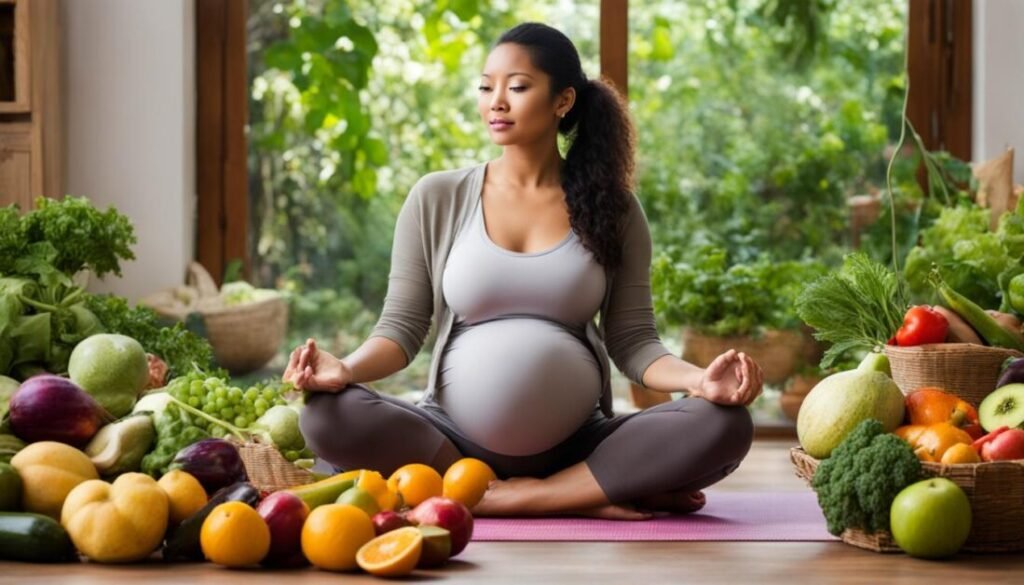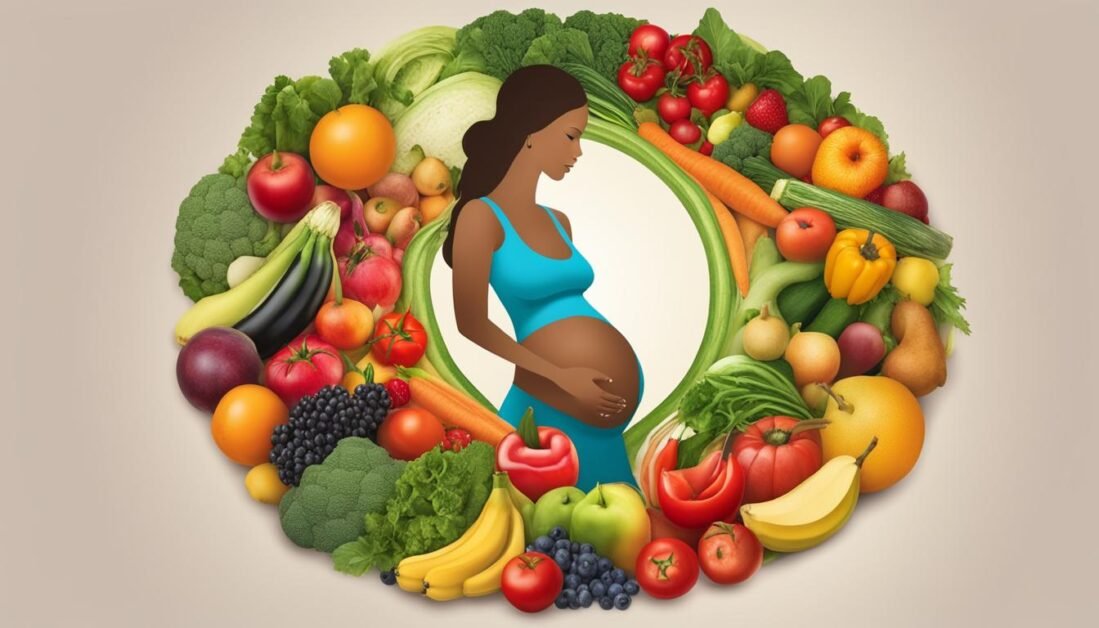Holistic Nutrition for Pregnancy: A Comprehensive Guide to Nourishing Both Mom and Baby
Pregnancy is a transformative experience that requires proper nutrition to support both the mother and the developing baby. Holistic nutrition takes a comprehensive approach to pregnancy nutrition, focusing on whole foods and natural supplements to provide essential nutrients like vitamins, minerals, enzymes, and phytonutrients. By following a holistic diet, pregnant women can improve their own health and give their babies the nourishment they need to grow strong. Poor nutrition during pregnancy can lead to attention deficits, lower cognitive functioning, obesity, and other health risks. To have a successful holistic pregnancy, it’s best to start preparing for conception by adopting a healthy lifestyle, including quitting smoking and drugs, limiting caffeine intake, and taking prenatal vitamins.

Key Takeaways:
- Holistic nutrition during pregnancy focuses on whole foods and natural supplements.
- A balanced diet is important for both the mother and the baby’s health.
- Poor nutrition during pregnancy can lead to various health risks for both the mother and the baby.
- Preparing for a holistic pregnancy involves adopting a healthy lifestyle before conception.
- Quitting smoking and drugs, limiting caffeine intake, and taking prenatal vitamins are crucial steps in preparation.
The Importance of Holistic Nutrition During Pregnancy
Holistic nutrition during pregnancy is crucial for the overall health and well-being of both the mother and the baby. It focuses on consuming whole foods and natural supplements to provide essential nutrients that support optimal growth and development. By following a holistic approach, pregnant women can reap numerous benefits for their own health and give their babies the best start in life.A holistic pregnancy diet consists of whole foods that are rich in vitamins, minerals, enzymes, and phytonutrients. These nutrients are vital for the baby’s development, ensuring they receive the necessary building blocks for healthy growth. Additionally, holistic nutrition helps to balance hormones, support digestion, and reduce the risk of gestational complications, enhancing the overall pregnancy experience.The benefits of holistic nutrition during pregnancy extend beyond physical health. It also promotes mental and emotional well-being, as it emphasizes the mind-body connection. Nourishing the body with wholesome foods can significantly impact mood and energy levels, reducing the likelihood of pregnancy-related discomforts. By adopting a holistic approach, pregnant women can prioritize their overall wellness and create a positive environment for their baby’s development.Risks of Poor Nutrition During Pregnancy
Poor nutrition during pregnancy can have significant risks for both the mother and the baby. When a pregnant woman doesn’t receive adequate nutrients, it can lead to various health complications and deficiencies.One of the major risks is micronutrient deficiencies, where the body lacks essential vitamins and minerals necessary for proper growth and development. This can result in impaired organ development, weakened immune system, and increased susceptibility to infections.In addition to micronutrient deficiencies, poor nutrition during pregnancy can also contribute to gestational complications. Gestational diabetes, preeclampsia, and premature birth are more likely to occur when the mother’s diet lacks necessary nutrients. These complications can have long-term consequences for both the mother and the baby.It is crucial for pregnant women to prioritize a balanced diet and proper nutrient intake to minimize these risks. By focusing on nutrient-dense foods, consulting with healthcare providers, and following a holistic approach to nutrition, women can support a healthy pregnancy and ensure the well-being of both themselves and their babies.When to Start Holistic Nutrition for Pregnancy?
Preparing for pregnancy is a crucial step in ensuring a healthy and successful journey. By adopting a holistic approach to nutrition and incorporating preconception care, couples can optimize their chances of conception and lay the foundation for a nourishing pregnancy. It is recommended to start focusing on holistic nutrition and healthy lifestyle habits before trying to conceive.Preconception care involves several key elements, such as quitting smoking, drugs, and alcohol, limiting caffeine intake, and managing stress levels. These steps are essential for creating a healthy environment for conception and supporting the development of a healthy baby. Additionally, taking prenatal vitamins and folic acid supplements can provide the necessary nutrients to support fetal growth and development.By starting a holistic nutrition plan before conception, couples can address any nutritional deficiencies, improve their overall health, and optimize their chances of a successful pregnancy. It is important to consult with healthcare providers or nutrition experts who specialize in holistic nutrition for personalized guidance and support throughout this journey.Holistic nutrition for pregnancy key points:
- Start focusing on holistic nutrition and preconception care before trying to conceive.
- Quit smoking, drugs, and alcohol, limit caffeine intake, and manage stress levels for a healthy environment.
- Take prenatal vitamins and folic acid supplements to support fetal growth and development.
- Consult with healthcare providers or nutrition experts for personalized guidance.
Quote:
“The path to a healthy pregnancy starts well before conception. By adopting a holistic approach to nutrition and incorporating preconception care, couples can ensure they are setting the stage for a nourishing and successful pregnancy.”

Foods You Should Eat More Of
During pregnancy, it is essential to fuel your body with nutrient-dense foods that provide the necessary vitamins and minerals for both you and your baby. Here are some foods that you should include more of in your holistic pregnancy diet:- Leafy greens: Incorporate plenty of leafy greens like spinach, kale, and Swiss chard into your meals. These greens are rich in folate, a vital nutrient for fetal development.
- Omega-3 fatty acids: Include sources of omega-3 fatty acids in your diet to support brain and eye development in your baby. Great sources include wild-caught salmon, chia seeds, and flaxseeds.
- Enzyme-rich foods: Opt for enzyme-rich foods like papaya, pineapple, and fermented vegetables to aid digestion and improve nutrient absorption.
“Eating a variety of nutrient-dense foods during pregnancy is crucial for the health and well-being of both mom and baby.”Remember to consult with your healthcare provider or a registered dietitian to personalize your diet based on your specific nutritional needs during pregnancy.
Foods to Avoid During Pregnancy
Pregnancy is a special time in a woman’s life, and it’s important to make sure you’re nourishing your body and protecting your baby’s health. There are certain foods that should be avoided during pregnancy to reduce the risk of foodborne illnesses and potential harm to your developing baby. Here are some key dietary restrictions to keep in mind:- High-mercury fish: Certain fish, such as shark, swordfish, king mackerel, and tilefish, have high levels of mercury, which can be harmful to your baby’s developing nervous system. Opt for low-mercury fish like salmon, sardines, and trout instead.
- Raw or undercooked foods: Raw or undercooked eggs, meat, poultry, and seafood can harbor harmful bacteria like Salmonella and Listeria. Make sure to cook these foods thoroughly to reduce the risk of foodborne illnesses.
- Caffeine intake: While it’s safe to consume a moderate amount of caffeine during pregnancy, excessive caffeine intake has been linked to increased risk of miscarriage and preterm birth. Limit your caffeine intake to 200 milligrams per day, equivalent to about one 12-ounce cup of coffee.
- Unpasteurized products: Avoid consuming unpasteurized milk, cheese, and juices during pregnancy, as they can contain harmful bacteria like E. coli and Listeria. Opt for pasteurized alternatives to reduce the risk of foodborne illnesses.

Supplements for a Healthy Pregnancy
In addition to maintaining a balanced diet, taking supplements can provide additional support for a healthy pregnancy. Prenatal vitamins are essential during pregnancy, as they are specifically formulated to provide the necessary vitamins and minerals for fetal development. These vitamins typically include folic acid, iron, calcium, and other essential nutrients. Taking prenatal vitamins can help ensure that both the mother and the baby receive the essential nutrients they need for optimal growth and development.Aside from prenatal vitamins, there are other supplements that may be beneficial during pregnancy. Folate, for example, plays a crucial role in preventing birth defects and supporting the baby’s neural tube development. Vitamin D is essential for the absorption of calcium, which is vital for the baby’s bone development. Iron is important for preventing anemia and promoting healthy red blood cell production. Omega-3 fatty acids, found in fish oil supplements, are beneficial for the baby’s brain and eye development.It’s important to note that while supplements can be helpful, they should not replace a healthy diet. They should be used to complement a balanced eating plan. It’s always best to consult with a healthcare provider before starting any new supplements during pregnancy to ensure they are safe and suitable for you and your baby’s specific needs.Remember, every pregnancy is unique, and what works for one person may not work for another. Your healthcare provider can provide personalized guidance based on your individual needs and circumstances. Together with a balanced diet, supplements can play a valuable role in supporting a healthy pregnancy journey.Herbs During Pregnancy
During pregnancy, many women turn to herbs as a natural way to enhance their health and well-being. From herbal teas to supplements, these natural remedies offer potential benefits for pregnancy discomforts. However, it’s important to approach the use of herbs during pregnancy with caution and seek guidance from a healthcare provider.Herbal teas can be a soothing and comforting option for pregnant women. Chamomile tea, for example, is known for its relaxing properties and can help with sleep disturbances or anxiety. Peppermint tea may provide relief from digestive issues such as nausea or bloating. However, it’s crucial to ensure that the herbal teas consumed are safe for pregnancy, as some herbs can have potential side effects or interact with medications.Herbal Supplements for Pregnancy
In addition to herbal teas, some pregnant women may consider using herbal supplements to address specific discomforts or support their overall well-being. For example, ginger supplements have long been used to alleviate morning sickness. Raspberry leaf supplements are often taken in the third trimester to support uterine health and prepare the body for labor. However, it’s important to remember that not all herbal supplements are safe for pregnancy. Consulting with a healthcare provider is essential to determine which supplements are appropriate for individual needs, as well as to ensure proper dosage and avoid potential risks.Natural Remedies for Pregnancy Discomforts
In addition to herbal teas and supplements, there are various natural remedies that can help address common discomforts experienced during pregnancy. For example, aromatherapy using essential oils like lavender or peppermint can provide relief from headaches or nausea. Acupuncture or acupressure may help alleviate back pain or promote relaxation. The key is to explore these natural remedies with guidance from a healthcare provider, who can provide personalized recommendations and ensure their safety.Overall, herbs can offer natural alternatives for pregnant women seeking relief from discomforts or looking to enhance their overall well-being. However, it’s crucial to approach the use of herbs during pregnancy with caution and consult with a healthcare provider. Each pregnancy is unique, and what works for one woman may not be suitable for another. By prioritizing safety and seeking professional guidance, pregnant women can explore the potential benefits of herbs while ensuring the well-being of both themselves and their babies.Integrative Nutrition for Pregnancy: A Holistic Approach to Nourishing Both Mom and Baby
When it comes to pregnancy nutrition, a holistic approach that considers the whole well-being of both the mother and baby is essential. Integrative nutrition takes into account not only the physical aspects of nourishment but also the mental and emotional factors that play a significant role in overall health. By adopting a whole-health approach to pregnancy, women can create a strong mother-baby connection and optimize their well-being during this transformative time.Mental and emotional factors are often overlooked when it comes to nutrition, but they can have a profound impact on a woman’s ability to nourish herself and her baby. Stress, anxiety, and mood imbalances can affect appetite, digestion, and nutrient absorption. By addressing these factors through mindfulness, self-care practices, and professional support, women can enhance their nutrition journey and promote a healthy pregnancy.Integrative nutrition for pregnancy also emphasizes the importance of nurturing gut health. A well-functioning digestive system is crucial for nutrient absorption and immune support. Including probiotic-rich foods such as yogurt, kefir, and fermented vegetables in the diet can help maintain a healthy balance of gut bacteria and support overall well-being.Holistic nutrition for pregnancy key points:
- Integrative nutrition takes into account the mental, emotional, and physical aspects of nourishing both the mother and baby.
- Addressing mental and emotional factors is essential for optimizing nutrition during pregnancy.
- Promoting gut health through probiotic-rich foods supports nutrient absorption and overall well-being.
“By adopting a holistic approach to pregnancy nutrition, women can create a strong foundation for both their own health and the health of their baby.”
Holistic nutrition for pregnancy conclusion
Holistic nutrition for pregnancy is a vital component of a healthy and nourishing pregnancy. By adopting a comprehensive approach to nutrition, pregnant women can ensure that both their bodies and their babies receive the essential nutrients needed for optimal growth and development. This comprehensive guide has provided valuable insights into the importance of holistic nutrition during pregnancy, the benefits it offers, the risks of poor nutrition, and practical tips for building a healthy pregnancy diet.Prioritizing nutrient-dense foods, such as leafy greens and omega-3 fatty acids, can provide the necessary vitamins and minerals for both mom and baby. Avoiding restricted foods, such as high-mercury fish and raw or undercooked foods, helps minimize the risk of foodborne illnesses and complications. Additionally, incorporating supplements when necessary, such as prenatal vitamins and natural remedies, can further support a healthy pregnancy.It is important for pregnant women to seek guidance from healthcare providers and make informed choices when it comes to their nutritional needs. By following a holistic approach to nutrition and seeking support from healthcare professionals, women can empower themselves to have a successful and nourishing pregnancy journey. Remember, a healthy diet is not only beneficial for the mother but also for the well-being of the baby.Holistic Nutrition For Pregnancy: FAQ’s (Frequently Asked Questions)
What is holistic nutrition for pregnancy?
Holistic nutrition takes a comprehensive approach to pregnancy nutrition, focusing on whole foods and natural supplements to provide essential nutrients for both the mother and the developing baby.
Why is holistic nutrition important during pregnancy?
Holistic nutrition is essential for improving the health of both the mother and the baby, providing the necessary vitamins, minerals, enzymes, and phytonutrients needed for optimal growth and development.
What are the risks of poor nutrition during pregnancy?
Poor nutrition during pregnancy can lead to attention deficits, lower cognitive functioning, obesity, and gestational complications such as gestational diabetes, preeclampsia, and premature birth.
When is the best time to start a holistic nutrition plan for pregnancy?
It’s best to start preparing for conception by adopting a healthy lifestyle, including quitting smoking and drugs, limiting caffeine intake, and taking prenatal vitamins.
What foods should pregnant women eat more of?
Pregnant women should consume more leafy greens for folate, wild-caught seafood for omega-3 fatty acids, and enzyme-rich foods for digestion.
What foods should be avoided during pregnancy?
High-mercury fish, raw or undercooked fish and meat, unpasteurized dairy products, raw eggs or foods containing raw eggs, unwashed fruits and vegetables, excessive caffeine, and certain herbal teas and supplements should be avoided during pregnancy.
What supplements are beneficial during pregnancy?
Prenatal vitamins, folate, vitamin D, iron, fish oil, magnesium, choline, and probiotics are some supplements that may be beneficial during pregnancy.
Can herbs be used during pregnancy?
Some herbs can be used to enhance pregnancy and provide relief from discomforts, but it’s important to use them with caution and consult with a healthcare provider beforehand.
What is integrative nutrition?
Integrative nutrition takes a holistic approach, considering the physical, mental, and emotional factors in nourishing both the mother and the baby during pregnancy.
What is the conclusion of holistic nutrition for pregnancy?
Holistic nutrition plays a crucial role in supporting a healthy and nourishing pregnancy, and by following a holistic approach to nutrition, pregnant women can provide their bodies and their babies with the essential nutrients they need for optimal growth and development.







